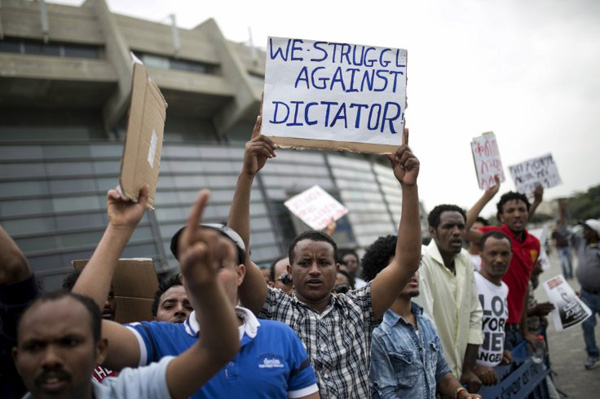GENEVA (16 September 2016) – The UN Special Rapporteur on the situation of human rights in Eritrea, Sheila B. Keetharuth, today called on the Eritrean Government to urgently provide information on the whereabouts and state of health of senior government officials and independent journalists arrested on 18 September 2001 and in the following days.
Fifteen years ago, the Eritrean authorities arrested and detained a group of senior cabinet ministers, members of parliament and independent journalists without charge or trial. To date, the Government has refused to share any information on their whereabouts and state of health.
“The Eritrean Government has denied those arrested their fundamental right to liberty and security of the person, right not to be subjected to torture, right to a fair trial as well as right to freedom of expression and opinion,” Ms. Keetharuth said ahead of the anniversary on Sunday. “Those arrested have been detained incommunicado and in solitary confinement. Even family members have never been allowed to have any contact whatsoever with them.”
“The 2001 clampdown set in motion a chain of egregious, widespread and systematic human rights violations that continues to this very day, including arbitrary arrests, incommunicado detention, denial of the right to a fair trial within a reasonable time, right not to be subjected to torture, and disappearances, among others,” the Special Rapporteur said. “In addition, the right to freedom of opinion and expression as well the right to freedom of the press has since then, also been negatively impacted.”
Earlier this year, the UN Commission of Inquiry on human rights in Eritrea* –of which Ms. Keetharuth was also a member- concluded that “there are reasonable grounds to believe that Eritrean officials have committed among others the crime of enforced disappearance, a crime against humanity.”
The Government of Eritrea said that the arrests and detentions of September 2001 were in response to national security threats posed by the prominent politicians and independent journalists. However, the expert stressed that “invoking national security as the main reason to violate basic fundamental human rights of Eritreans cannot be perpetual.”
“All those arrested in September 2001, as well as of all other detainees, including those arrested in the aftermath of the 2013 ‘Forto’ incident should either be brought to court or released unconditionally and immediately if not charged,” she said. “Furthermore, the Eritrean authorities should allow independent monitors to have unhindered access to all detainees in the country as a matter of priority.”
The Special Rapporteur recalled that Eritrea is party to the International Covenant on Civil and Political Rights since 2002, to the African Charter on Human and Peoples’ Rights since 1999 and to the Convention against Torture since 2014.
“However, it has consistently failed to give effect to their provisions guaranteeing universal fundamental human rights to its people,” Ms. Keetharuth noted. “It is time to reverse this trend and ensure accountability for past and ongoing crimes.”
(*)Check the Commission of Enquiry’s report: http://www.ohchr.org/EN/HRBodies/HRC/CoIEritrea/Pages/2016ReportCoIEritrea.aspx
Ms. Sheila B. Keetharuth was appointed as the Special Rapporteur on the human rights situation in Eritrea during the 21st Session of the UN Human Rights Council in September 2012. She took her functions on 1 November 2012 and was member of the Commission of Inquiry on human rights in Eritrea (COIE) from June 2014 to June 2016. As Special Rapporteur, she is independent from any government or organization and serves in her individual capacity. A lawyer from Mauritius, she has extensive experience in monitoring and documenting human rights violations, advocacy, training and litigation in human rights in Africa. Learn more, log on to: http://www.ohchr.org/EN/HRBodies/SP/CountriesMandates/ER/Pages/SREritrea.aspx
The Special Rapporteurs are part of what is known as the Special Procedures of the Human Rights Council. Special Procedures, the largest body of independent experts in the UN Human Rights system, is the general name of the Council’s independent fact-finding and monitoring mechanisms that address either specific country situations or thematic issues in all parts of the world. Special Procedures’ experts work on a voluntary basis; they are not UN staff and do not receive a salary for their work. They are independent from any government or organization and serve in their individual capacity.
UN Human Rights, country page – Eritrea: http://www.ohchr.org/EN/Countries/AfricaRegion/Pages/ERIndex.aspx
- See more at: http://www.ohchr.org/EN/NewsEvents/Pages/DisplayNews.aspx?NewsID=20515&LangID=E#sthash.GCyzpRv0.dpuf


